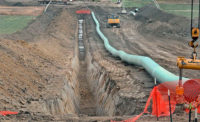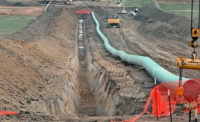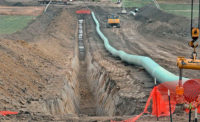The $3.8 billion Dakota Access pipeline can continue to operate while the U.S. Army Corps of Engineers completes its environmental review of the project, likely to take until March 2022, but the question of a shutdown remains on the table.
At an April 9 hearing, a U.S. Justice Dept. attorney told Brian Boasberg, U.S. district court judge in Washington, D.C. that the Corps doesn't plan to shut down the 1,172-mile pipeline, which starts in North Dakota and ends in southern Illinois.
But it could change its mind after consulting with officials from tribes and North Dakota. The pipeline moves more than half a million gallons of crude oil daily. It crosses Lake Oahe, which the Standing Rock Sioux rely on for drinking water.
Department attorney Ben Schifman said the Corps wants to take stakeholder's views into account before it decides, saying the agency is in a continuous process of evaluating the safety of the pipeline. He added the Biden administration could shut down operations at any time before the Corps completes an Environmental Impact Statement for the project. The pipeline has been operating for about three years.
In a complicated case that has gone on for years, Boasberg ordered an immediate shutdown of the pipeline in 2020. The federal appeals court in Washington, D.C. overruled him but agreed the Corps violated federal law in 2016 when it issued permits for the pipeline to cross beneath the Missouri River.
The EIS will study the risk that an oil spill poses to the Standing Rock Sioux and will decide whether to reissue the permit or require an alternative route that mitigates risk to the tribe.
In 2015 the Corps issued a draft environmental assessment finding construction would have no significant environmental impact. Both the U.S. Dept. of Interior and the U.S. Environmental Protection Agency raised concern the assessment lacked significant analysis of the impact on water resources.
The Corps decided in January 2017 to prepare an EIS, but the Trump administration directed the agency to expedite approvals and reconsider that decision. In February 2017, the Corps granted the easement for the pipeline to travel under the lake without the complete EIS.
Jan Hasselman, an EarthJustice attorney representing the Standing Rock Sioux, expressed disappointment that Boasberg didn't order a shut down. Tribes and environmental groups were dismayed by Biden’s decision not to shut down the pipeline given his climate platform.
But he said they would ask the judge “to shut the pipeline down under a judicial standard. We will continue this fight for as long as it takes.”
According to Hasselman, in a press conference after the hearing, the Corps shut out the tribes and their cultural experts in developing the original environmental review. “It’s critical that the Corps take the time to engage with tribes as sovereign nations to make sure the decision is fully informed,” he said.
Energy Transfer, owner of the Dakota Access, did not respond to a request for comment by press time.
Mountain Valley Pipe Starts and Stops
Another pipeline in the spotlight, the $5.4 billion, 303-mile Mountain Valley line that will carry natural gas from the Marcellus Shale region in northwestern West Virginia to southern Virginia, on March 24 received Federal Energy Regulatory Commission approval to continue construction but now faces a new state roadblock.
FERC had originally authorized construction in early 2018 but work has started and stopped since the Corps vacated the project’s Nationwide Permit-12 permit in October 2018 and reinstated it in September 2020. The permit allows project-wide ability to build across water bodies.
The federal court of appeals in Richmond, Virginia vacated the reinstated Corps permit in December 2020.
At issue now is whether a FERC environmental rule requires the project to obtain, but also retain, all federal permits throughout construction.
Environmental groups, including the Sierra Club, argued that if federal permits for some parts of the project are no longer valid, then completing other segments makes no sense.
The project, a joint venture of EQM Midstream Partners and NextEra Capital Holdings, is about 92% complete and had been expected to begin service this year.
Delays caused by the various shutdowns have added about 5% to the project’s original $5.4-billion cost.
FERC said in its order last month that the environmental rule applies to newly certified projects and unconstructed facilities, and "does not apply to a scenario where applicable federal authorizations are vacated” after the permits were issued and construction started.
“Once significant construction is underway, completion of construction and final restoration, where permitted, is best for the environment and affected landowners,” FERC said, noting that work under Section 404 of the Clean Water Act cannot proceed until the Corps issues authorizations.
FERC Chairman Richard Glick and Commissioner Allison Clements dissented, saying that, at this point, Mountain Valley lacks federal authorization to cross 700 water bodies and wetlands.
“Under these circumstances, allowing piecemeal construction of a project that is still awaiting critical federal authorizations is inconsistent with any reasonable reading of the purposes" behind the environmental rule] for the project, "not to mention our responsibilities to landowners, communities and others who have interests at stake,” they said.
Also, on April 1, the Virginia Dept. of Environmental Quality told Corps officials that the state agency would be unable to meet a July 2 deadline to issue stream crossing permits, estimating these would be delayed until at least December and possibly until early 2022.
Virginia law requires a pipeline of Mountain Valley’s width, 42-in dia., to obtain a separate permit for each wetland and stream crossing.
Meanwhile, two ranking House and Senate Republicans urged President Joe Biden, in an April 7 letter, to allow the Corps to issue the nationwide project water crossing general permits for those "with limited environmental impact," as the administration reviews the permits that face new opposition and legal challenges.
"Revocation of the Corps’ duly issued nationwide permits in pursuit of nominal environmental benefits would hurt our chances at a strong recovery, and hinder needed improvements to our nation’s infrastructure," said Rep. Sam Graves (R-Mo), ranking member of the House Committee on Transportation and Infrastructure, and Shelley Moore Capito (R-W.Va.), ranking Senate Environment and Public Works Committee member. "It is critically important that we continue to pursue policies that responsibly protect our environment and support economic growth and job creation.”






Post a comment to this article
Report Abusive Comment